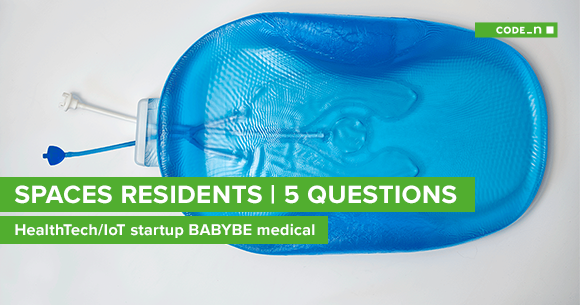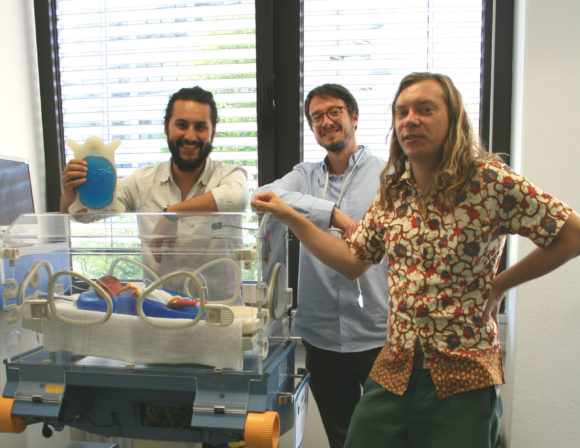CODE_n SPACES Residents | Five questions to BABYBE medical, a revolutionary HealthTech startup
Ta-da! Say hello to our new CODE_n SPACES resident BABYBE medical! Every year, 3.3 million babies are born preterm. The big problem is that current incubators do not have the means to foster brain development in premature babies, who need a womb-like environment with something that feels like the heartbeat and voice of the mother. This can now change thanks to “bionic emulation” of the mother’s body, provided by the ingenious technology of BABYBE! We’re delighted to introduce our new CODE_n community member in the HealthTech/IoT sector: BABYBE medical. We asked CTO and founder Raphael Lang 5 questions about the startup, life as an entrepreneur, and the cool stuff they’re doing.

1. Hi to everyone at BABYBE and once again a warm welcome to CODE_n SPACES! Your HealthTech startup only recently moved into its new premises at CODE_n. What exactly does BABYBE do and what does your business concept have to do with digital transformation?
Almost 12% of all children are now born preterm and they sometimes have to spend weeks or even months in an incubator in intensive care. Some of these tiny children weigh as little as 500 grams. For the parents this can be a really harrowing time and so many things are completely new to them. It’s also a time when the young baby’s brain is just going through a really crucial stage of physical or structural development – a good 90% of all life-long synaptic connections are formed during this time. One of the things preterm babies miss most is the heartbeat, voice, and breathing movements of the mother. Without this important sensory input the underdeveloped brain is not receiving the stimuli it needs to develop properly. So we’ve developed a device that replicates the bionic sensation of a woman’s chest. In tactile terms, the premature baby feels like it’s lying on its mother. The key bit is that the breathing, heartbeat, and voice come from the baby’s actual mother in real time. One of the important psychological aspects with this is that a mother can actively do something for the development of her child. This is extremely important for bonding between the mother and the child.
BABYBE is also the world’s first example of a medical technology that really makes use of all the possibilities offered by the internet of things (IoT). We can even transmit the mother’s voice and heartbeat when she’s at home – to the hospital, to the incubator, directly to the premature baby in intensive care. We do this by using smartphones and smartwatches in combination with our own app. This adds an important extra dimension to the scope of the BABYBE system.
2. How did you first hear about CODE_n and what made you decide to come to the Innovation Campus to move your startup forward?
We heard about it through our investment manager at MBG Baden Wuerttemberg. In fact, I’d like to say thank you at this point for that! CODE_n is an awesome location that goes far beyond just offering you an office. It’s got networking options, marketing, and important ways to exchange ideas with other startups and organize brainstorming sessions. We find it so exciting being in an office environment where there’s such a buzz. In design terms, too, the aesthetics of the Innovation Campus are great – you know, some of us studied at the art academy in Stuttgart so as business founders we also have to appreciate that aspect.
3. What have been the biggest obstacles you’ve had to overcome in setting up your company?
Taking medical technology from an initial concept through all the medical approvals and clinical studies is a long and rocky road. We originally set up the business in 2011 and it wasn’t until the end of 2016 that we’d gotten CE approval. For a business venture, five years of R&D is a real slog. Even in 2011, there was basically zero interest in Baden-Wuerttemberg in hardware startups. Even though we had the complete support of the medical team at the hospital in Stuttgart, we couldn’t find risk capital or any funding programs for us in Germany. So in 2012 we shifted our startup to Shenzhen, China, and Santiago de Chile – we did get investments there and in 2014 we even did stuff in San Francisco with the Intel® Make It Wearable challenge. By the end of 2015 every penny of funding had come from outside Germany. But the positive side was that from the get-go, our product could be tested internationally and we got media coverage on the BBC and in The Economist. Now that it comes to the manufacturing side of things we’d like to produce the technology in Baden-Wuerttemberg. But so far we’ve not managed to find OEM partners that are genuinely interested in entering into a partnership with a startup on fair terms and are really interested in manufacturing an innovative product together. We’re currently producing just outside of Berlin, in Nuremberg, and in China but it’s a bit of a logistical challenge. Something’s shifted with the mindset in Stuttgart, but it’s still a bit of an uphill struggle working on a startup in a location like Stuttgart, especially if we want to keep our avant-garde players here.

The full team moved into the Innovation Campus at CODE_n SPACES in Stuttgart in March. The heathtech/IoT startup is developing sophisticated medical technology to give premature babies the feeling that they’re in physical contact with the mother (pictured: Camilo Anabalon, Max Blendinger and Raphael Lang).
#1 Launch the product right at the beginning in the United States and China and do whatever you can to get on board a well-known US or Chinese accelerator program like Hax.co, Start-Up Chile, or Intel® MIW.
#2 Develop and test the product with pilot customers.
#3 Get yourself a co-founder you have a spiritual kinship with.
5. And next – where do you see yourselves in five years?
For us as the founders of BABYBE, it’s a springboard for turning science fiction and robotics into a reality. We recently went to the movies and saw Ghost in the Shell. We’re also working on a new bionic product in the field of home care at the moment. BABYBE is already in use in four European countries in everyday clinical situations. Our goal is for BABYBE to be offering every premature baby in Europe the same opportunity to receive care and support with its development.
Thanks Raphael for those insights. Make yourselves at home here. It’s great to have you as part of the CODE_n family!





Comments